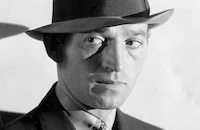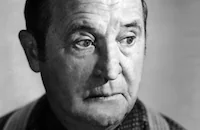Doll Face

Brief Synopsis
Cast & Crew
Lewis Seiler
Vivian Blaine
Dennis O'keefe
Perry Como
Carmen Miranda
Martha Stewart
Film Details
Technical Specs

Synopsis
When burlesque queen Doll Face Carroll auditions for impresario Flo Hartman's new Broadway show, he arrogantly turns her down and tells her manager, Michael Francis Hannegan, that Doll Face does not have enough class for a "legit" show. Mike, who is also Doll Face's boyfriend and the owner of the Gayety Theatre, where she works, is insulted by Hartman's attitude, especially as Doll Face is the hottest attraction in burlesque. After the irritating encounter with Hartman, Mike stops by a local drugstore and is given a free copy of a book by Frederick Manly Gerard. The book, which sold poorly despite receiving excellent reviews, sets Mike thinking about how to give Doll Face a veneer of culture, and he decides that she should write an autobiography called The Genius DeMilo . Doll Face is skeptical about the idea, but Mike assures her that he will hire a good ghostwriter. Mike then calls Gerard, who comes to the theater because he believes that Mike is offering him a job concerning a legitimate actress. The blue-blooded Gerard is amused by the idea of becoming involved with "burleycue" but still turns down Mike's offer. When Gerard meets the lovely Doll Face, however, he changes his mind and begins interviewing her. Chita Chula, Doll Face's friend and fellow performer, is suspicious about Gerard's interest in Doll Face, but Mike brushes aside her concerns. Mike does listen, however, when Chita points out that Mike's theater will suffer if Hartman is impressed enough with Doll Face's book to hire her. Mike decides to stage a legitimate musical of his own, starring Doll Face, and Gerard offers to supply the necessary funds. Time passes as the troupe rehearses the show and Gerard finishes the book. Gerard, who has fallen in love with Doll Face, tells her about his feelings, but she cares only for Mike. Mike, whose jealousy has finally been provoked, angers Doll Face when he declares that the book does not need to be published, as they have already received enough publicity from it. Although Mike's only motive is to separate Doll Face and Gerard, Doll Face assumes that he is denigrating the book and insists on going with Gerard the next day to see their publisher, Spencer Bennett. On the way to Bennett's island, however, the motorboat that Gerard has rented breaks down, and after a few hours of drifting, the couple swims for the shore. Mike frantically searches for Doll Face, and when he finds her asleep on the beach the next morning, he assumes that she and Gerard have spent more than an innocent night together. Mike's angry condemnation breaks Doll Face's heart, and they end both their professional and personal relationships. As two months pass, Frankie Porter, Doll Face's replacement, cannot attract the same crowds, and Mike is forced to close the theater. Meanwhile, Hartman's new show has a disasterous out-of-town run, and he asks Doll Face to star in a new show for him. Gerard suggests dramatizing The Genius DeMilo , which has become a success, and Hartman hires the now out-of-work troupe from the Gayety to put it on. During rehearsals, Doll Face becomes distraught by scenes recreating her romance with Mike, and breaks off her relationship with Gerard, who has proposed to her. Doll Face refuses to forgive Mike, despite Chita's efforts to reunite them, and Mike concocts a scheme to force her to talk to him. On the opening night of the new show, Mike files an injunction prohibiting Doll Face from performing by claiming that she is still under contract to him. When the infuriated Doll Face confronts him, Mike tenderly tells her that he only wanted to talk to her, and that he wishes her happiness in her new life. Won over by Mike's apologies, Doll Face helps him to trick Hartman into giving him a quarter share in the new show, as well as co-producer credit. Doll Face then goes on with her performance and smiles happily at Mike, who waits for her in the wings.

Director
Lewis Seiler
Cast

Vivian Blaine

Dennis O'keefe

Perry Como

Carmen Miranda

Martha Stewart
Michael Dunne
Reed Hadley
Stanley Prager
Charles Tannen

George E. Stone

Frank Orth

Donald Mcbride
Ciro Rimac
Hal K. Dawson
Charles Williams
Edgar Norton
Boyd Davis
Alvin Hammer

Lex Barker
Jimmy Cross
Les Clark
Ted Jordan
William "red" Murphy
George Melford
Harold "red" Knight
Harry Seymour
Philip Morris
Steve Olsen
Marion De Sydow
Patsi Mahar
Valerie Traxler
Juanita Cole
Marcia Sweet
Crew
Harold Adamson
Lloyd Ahern
Charles Althouse
Harold Buchman
Norman Colbert
Bryan Foy
Bryan Foy
Gaston Glass
Eugene Grossman
Charles Hall
Edwin Hammeras
Charles Henderson
Charles Henderson
Harry Jones
R. A. Klune
Joseph Lashelle
Harry M. Leonard
Boris Leven
Thomas Little
Ray Mala
Jimmy Mchugh
Paul Neal
Emil Newman
Lionel Newman
Ben Nye
Arthur Pierson
Leonard Praskins
Gene Rose
Fred Sersen
Edward Snyder
Murray Spivack
Jack Stubbs
Lyle Wheeler
Kenny Williams
Yvonne Wood

Film Details
Technical Specs

Quotes
A woman needs a man. You are a man, aren't you?- Chita
Do you mean to stand there and tell me I ain't got class? Why, in Duluth, I was billed as the... You tell 'em, Mike.- 'Doll Face' Carroll
You think I'll make good on Broadstreet?- Chita
Trivia
Notes
The working titles of this film were The Naked Genius and Here's a Kiss. Playwright and renowned stripper Gypsy Rose Lee is credited onscreen as Louise Hovick, which was her real name. Noting the billing, the Variety reviewer commented: "Pic could be exploited by use of the fact that Gypsy Rose Lee wrote the stage play, The Naked Genius, on which the script is based, and also by the fact that film has an autobiographical tinge in its story of a burlesque queen who writes the story of her life. But Twentieth Century-Fox, presumably fearing a boomerang, credits neither play nor authoress' w.k. [well-known] stage-name, merely listing pic as based on 'a play by Louise Hovick.'" Although a April 6, 1944 Hollywood Reporter news item noted that producer George Jessel offered Lee a role in the picture, she does not appear in the finished film.
In June 1944, Hollywood Reporter announced that Carole Landis would star in the film, and that Jackie Gleason would have the "comedy lead." According to July 1945 Hollywood Reporter news items, William Eythe was scheduled to play the "romantic lead," and fifteen-year-old singer Hazel Dawn had been included in the cast. Dawn's appearance in the completed picture has not been confirmed, however. Dennis O'Keefe was borrowed from Edward Small's company for the film, which marked the screen debuts of Martha Stewart and Lex Barker. According to a August 3, 1945 Daily Variety news item, producer Bryan Foy filled in for director Lewis Seiler for three days while Seiler was ill.
According to information in the MPAA/PCA Collection at the AMPAS Library and the Twentieth Century-Fox Records of the Legal Department, located at the UCLA Arts-Special Collections Library, the Breen Office refused to allow the studio to use The Naked Genius as either the title of the film or of "Doll Face's" autobiography. The PCA also strongly protested the depiction of "Doll Face" as a stripper and disapproved several screenplays submitted by the studio. In late July 1945, PCA head Joseph I. Breen cautioned studio public relations head Jason S. Joy: "Please have in mind that any time you undertake to identify a character as a 'strip tease' artist, you run the risk of giving enormous offense everywhere. People, pretty generally, look up [sic] the business of the burlesque shows-and, more importantly, the strip tease-as, possibly, the very lowest form of public entertainment, and this same viewpoint is reflected in the reaction of the Censor Boards."
In August 1945, Joy replied to Breen, in regard to a conference concerning the film attended by studio and PCA officials: "All of us distinctly understood that the strip tease flavor in Doll Face was not considered by you to be a violation of the Code, but that you were merely (and earnestly) warning us that any reference to strip tease would get us into an awful lot of trouble." Although the PCA continued to protest the film's burlesque setting, it was eventually given a production code seal and encountered few problems with state or city censor boards. The Breen Office also disapproved the lyrics for "Chico Chico (From Porto Rico)," stating that it constituted "a burlesque of the Latin-American character, and hence as such would unquestionably give offense to Latin Americans generally." The song lyrics were changed slightly and later approved.
According to the studio records, Jimmy McHugh and Harold Adamson submitted the song "True to the Navy" for inclusion in the film, and a production number featuring it was filmed. McHugh and Adamson had previously submitted the song to Paramount, however, which used it in their 1945 release Bring on the Girls. Paramount refused to license the song for use in Doll Face, and the number, which cost between $60,000 and $75,000 to film, had to be cut. In a December 1945 letter to Twentieth Century-Fox studio president Spyros Skouras, studio attorney George Wasson speculated that Paramount refused to license the song because Twentieth Century-Fox had obtained the distribution rights to Tales of Manhattan, which Paramount had desired, and because Twentieth Century-Fox had succeeded in getting clearance for the use of the title Sentimental Journey, which Paramount also wanted. The legal records also reveal that Irving Weissman filed suit against the studio, claiming that the song "Dig You Later (A Hubba-Hubba-Hubba)" had been plagiarized from one of his compositions. The case was dismissed in September 1948 by a federal court judge, but Weissman again filed suit through a state court. The disposition of the second suit has not been determined.












